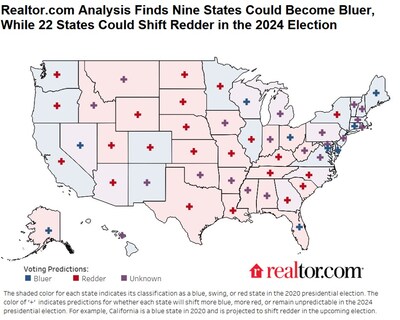Three swing states, Arizona, Georgia and North Carolina, could potentially trend redder, while two swing states, Wisconsin and Nevada, could shift bluer
SANTA CLARA, Calif., Oct. 15, 2024 /PRNewswire/ -- Ahead of the presidential election in November, Realtor.com® released a new report today, which used proprietary data on geographic home shopping trends and county-level 2020 election results to try to predict how population shifts could reshape the political landscape. As we look towards this presidential election, not only do shifting opinions on key topics like home prices, and housingaffordability for both homeowners and renters have the possibility to impact the outcome of the election, the movement of people from state to state could potentially play a role in the 2024 presidential election.

"The influence of migration on election outcomes is a compelling topic of discussion, sparking interest in how shifting populations might reshape the political landscape, " said Danielle Hale, Chief Economist, Realtor.com®. "As more people move across state lines, their voting habits could have the potential to sway election outcomes, especially in crucial swing states, where even small changes in the electorate can tip the scales. This dynamic raises important questions about how migration trends could influence the future of American politics this year and beyond."
This analysis highlights migration-informed possibilities that may factor alongside voter preferences on key issues to influence the Presidential election in 2024. Because neither people nor opinions are fixed, the U.S. electoral map is constantly changing. In the report, if a state receives a higher traffic influx from shoppers predicted to be red than from shoppers predicted to be blue and has a higher retention rate of local home shoppers predicted to be red compared to those predicted to be blue, the state is anticipated to trend redder in the 2024 election. Conversely, if a state draws more influx traffic that is predicted to be blue than influx traffic that is predicted to be red and has a higher retention rate among local home shoppers who are predicted to be blue, the state is anticipated to become bluer in the 2024 election. (See full methodology for how a shopper's political affiliation is predicted).
The new report found the following possibilities for the 2024 Presidential election:
- Four blue states—Connecticut, Delaware, District of Columbia, Maine—could trend bluer
- Seven blue states—California, Colorado, Illinois, Minnesota, New York, Oregon and Washington— could trend redder
- Three red states—Alaska, Florida and Ohio— could shift bluer
- Twelve red states—Kansas, Kentucky, Louisiana, Missouri, Nebraska, North Dakota, South Carolina, South Dakota, Tennessee, Texas, Utah and Wyoming— could trend redder
- Three swing states—Arizona, Georgia and North Carolina— could trend redder
- Two swing states—Wisconsin and Nevada— could shift bluer
- Two swing states–Michigan and Pennsylvania–have mixed population shifts that do not suggest a clear direction–red or blue–for the local electorate
Out of State Migration Preferences
When a state receives a higher influx of blue shoppers compared to red shoppers, it is a more appealing out-of-state destination for blue buyers, and vice versa. New Jersey, with the largest difference of 1.4 percentage points between blue and red influx rates, attracts more blue shoppers, while Tennessee with a difference of 0.5 percentage points, is the most favored destination for out-of-state red buyers.
Florida (12.9%), Texas (5.8%) and North Carolina (5.1%) rank among the top destinations for blue home shoppers.
Florida (12.8%), Texas (5.8%) and North Carolina (5.3%) also rank among the top destinations for red home buyers. Interestingly, both blue and red out-of-state home shoppers showed great interest in homes in the South, probably driven by the relatively affordable housing markets and warmer climate.
Where do blue and red home shoppers remain?
A desirable location for potential home buyers is not only defined by its ability to attract new migrants, but also by the willingness of current residents to stay. To estimate the retention rate for in-state blue and red home buyers for each state, the analysis calculates the proportion of in-state blue and red home buyers who choose to shop homes within their own state. New Mexico retains the most in-state blue shoppers when compared to the rate of red shoppers, and New York retains the most in-state red home shoppers.
Methodology:
To analyze the shifting interests and patterns of U.S. home shoppers, this research utilizes online home shopping traffic data from Realtor.com spanning January 2021 to September 2024. To further explore moving interests by political affiliation, we examine county-level results from the 2020 presidential election. We determine the likelihood of each online view being associated with a blue, red, or independent shopper based on the proportion of votes each party received in the 2020 presidential election.
For instance, if 60% of voters in a county were Democrats, we would estimate that 60% of online traffic from that county comes from blue shoppers. This approach simplifies the analysis by assuming that the political affiliations of online home shoppers mirror the voter distribution in their respective counties. However, we do not consider other factors such as income, age, or housing preferences that may also influence online home shopping behavior.
About Realtor.com®
Realtor.com® is an open real estate marketplace built for everyone. Realtor.com® pioneered the world of digital real estate more than 25 years ago. Today, through its website and mobile apps, Realtor.com® is a trusted guide for consumers, empowering more people to find their way home by breaking down barriers, helping them make the right connections, and creating confidence through expert insights and guidance. For professionals, Realtor.com® is a trusted partner for business growth, offering consumer connections and branding solutions that help them succeed in today's on-demand world. Realtor.com® is operated by News Corp [Nasdaq: NWS, NWSA] [ASX: NWS, NWSLV] subsidiary Move, Inc. For more information, visit Realtor.com®.
Media Contact
Mallory Micetich, press@realtor.com
 View original content to download multimedia:https://www.prnewswire.com/news-releases/realtorcom-analysis-finds-nine-states-could-potentially-become-bluer-while-22-states-could-shift-redder-in-the-2024-election-302275707.html
View original content to download multimedia:https://www.prnewswire.com/news-releases/realtorcom-analysis-finds-nine-states-could-potentially-become-bluer-while-22-states-could-shift-redder-in-the-2024-election-302275707.html
SOURCE Realtor.com
